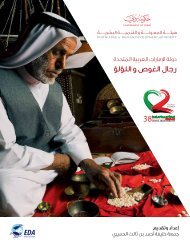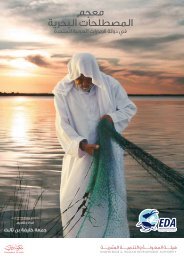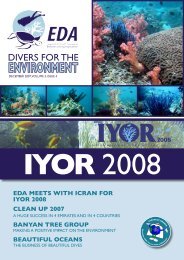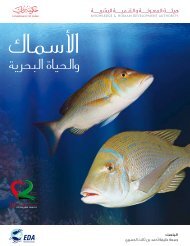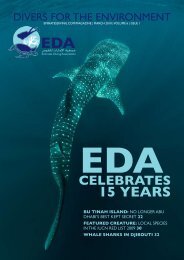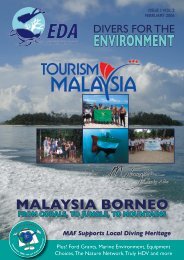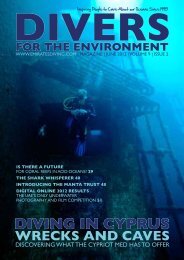Download - Emirates Diving Association
Download - Emirates Diving Association
Download - Emirates Diving Association
You also want an ePaper? Increase the reach of your titles
YUMPU automatically turns print PDFs into web optimized ePapers that Google loves.
REEF CHECK<br />
REEF CHECK IRAN HOLDS<br />
STUDENT WORKSHOP<br />
FEATURE Mohammad Ghavasi,<br />
Reef Check Iran<br />
REEF CHECK SPOTLIGHT: US RELEASES IMPLEMENTATION<br />
PLAN FOR NATIONAL OCEAN POLICY<br />
Photography Robert Thorn<br />
and decision-makers can use; and<br />
collaborate more effectively with<br />
State, Tribal, and local partners,<br />
marine industries, and other<br />
stakeholders. The Plan also ensures<br />
the many Federal agencies involved<br />
in ocean management work<br />
together without creating any new<br />
regulations or authorities.<br />
REEF CHECK<br />
REEF CHECK HAITI’S 2 nd ECODIVER TEAM LEARNS TO DIVE<br />
FEATURE Maya Shoup, PADI Instructor<br />
Mohammad Ghavasi of Reef Check Iran<br />
recently held a workshop for marine biology<br />
students at Shahid Beheshti University in<br />
Tehran. Entitled “Introduction to <strong>Diving</strong><br />
& Underwater World”, the workshop<br />
introduced Reef Check to the participants and<br />
explained how they can act to help save our<br />
coral reefs. As a result, many new volunteers<br />
were found who will be able to participate in<br />
future activities.<br />
The first Reef Check brochure published in<br />
Persian was given to the participants; donors<br />
willing to assist with the publication of a<br />
second brochure are currently needed.<br />
Thank you to Mr. R. Bahmai and Miss S. Alassi,<br />
who assisted with the lecture, as well as Mr. A.<br />
Bitaab and his wife Mrs. S. Mosafer who held<br />
the workshop.<br />
To participate or support Reef Check Iran,<br />
please contact Mohammad Ghavasi at marine.<br />
gh111@gmail.com or +98-936-896-3171<br />
Earlier this April, the Obama Administration<br />
released its final plan for putting the National<br />
Ocean Policy into action.<br />
Established in 2010, the National Ocean Policy<br />
envisioned “an America whose stewardship<br />
ensures that the ocean, our coasts, and the<br />
Great Lakes are healthy and resilient, safe and<br />
productive, and understood and treasured so<br />
as to promote the well being, prosperity, and<br />
security of present and future generations.”<br />
The policy states that Federal agencies will<br />
“ensure the protection, maintenance, and<br />
restoration of the health of oceans, coastal<br />
and Great Lakes ecosystems and resources,<br />
enhance the sustainability of ocean and coastal<br />
economies, preserve our maritime heritage,<br />
support sustainable uses and access, provide<br />
for adaptive management to enhance our<br />
understanding of and capacity to respond to<br />
climate change and ocean acidification, and<br />
coordinate with our national security and<br />
foreign policy interests.”<br />
In January 2012, a draft National Ocean Policy<br />
Implementation Plan was released and public<br />
comments on the plan were solicited, as well<br />
as input from stakeholders from all marine<br />
sectors. The plan identified key actions toward<br />
fulfilling the plan’s vision.<br />
The final implementation plan released on April<br />
16, 2013 focuses on improving coordination<br />
to speed Federal permitting decisions; better<br />
manage the ocean, coastal, and Great Lakes<br />
resources that drive so much of our economy;<br />
develop and disseminate sound scientific<br />
information that local communities, industries,<br />
“With increasing demands on our<br />
ocean, we must improve how we<br />
work together, share information,<br />
and plan smartly to grow our<br />
economy, keep our ocean healthy,<br />
and enjoy the highest benefits from<br />
our ocean resources, now and in<br />
the future,” said Nancy Sutley, Chair<br />
of the Council on Environmental<br />
Quality and Co-Chair of the<br />
National Ocean Council, the<br />
interagency council established<br />
in 2010 to oversee the Policy’s<br />
implementation.<br />
“Science is the foundation upon which sound<br />
management of ocean and coastal resources<br />
is based,” said John P. Holdren, Director of the<br />
White House Office of Science and Technology<br />
Policy and Co-Chair of the National Ocean<br />
Council. “The President’s National Ocean Policy<br />
and the new implementation plan will help<br />
advance relevant science and its application to<br />
decision-making to strengthen the economies<br />
of our coastal regions while increasing their<br />
resilience and sustaining their resources.”<br />
The oceans and coasts of the United States<br />
support tens of millions of jobs and contribute<br />
trillions of dollars a year to the national<br />
economy through tourism, development,<br />
commercial fishing, recreational fishing and<br />
boating, energy, shipping, and other activities.<br />
Competition for increasingly vulnerable ocean<br />
resources is growing, presenting challenges<br />
for Federal agencies that follow and enforce<br />
more than 100 ocean-related laws. The final<br />
Implementation Plan describes specific actions<br />
Federal agencies will take to address key<br />
ocean challenges, give states and communities<br />
greater input in Federal decisions, streamline<br />
Federal operations, save taxpayer dollars, and<br />
promote economic growth.<br />
To read the Implementation Plan, visit www.<br />
whitehouse.gov/oceans.<br />
Sources:<br />
“Obama Administration Releases Plan to<br />
Promote Ocean Economy and Resilience”<br />
Press Release.<br />
Department of the Interior National Ocean<br />
Policy webpage.<br />
What an experience to cherish!<br />
My travels to the north shore of Haiti with<br />
Reef Check to teach 15 university students<br />
the PADI Open Water Diver course are the<br />
reasons I became a PADI instructor. Not only<br />
to make a difference in an individual’s life, but<br />
to also raise awareness about our ocean and its<br />
conservation…to make a change!<br />
Haiti’s coral reefs and fish populations have<br />
been on a dramatic decline over the years due<br />
to overfishing. Local fishermen can no longer<br />
find big fish to catch so are now targeting<br />
smaller fish like parrotfish, snappers, grunts<br />
and more. These fish are all that’s left due to<br />
overfishing and the lack of fishing regulations<br />
and marine protected areas – the reefs of Haiti<br />
are under threat of extinction. As Reef Check<br />
builds their EcoDiver teams in Haiti, they are<br />
also building awareness about the importance<br />
of restoring, replenishing and protecting what<br />
little coral and fish they have left.<br />
With over 300 applicants wishing to become<br />
EcoDivers in Cape Haitien, Reef Check’s team<br />
had some work to do to pick the most suitable<br />
15 candidates who could learn to swim, snorkel<br />
and ultimately have a chance of passing their<br />
PADI Open Water course. Before I arrived in<br />
Haiti to teach their SCUBA course, these 15<br />
students had successfully learned how to swim<br />
and snorkel. As their skills and confidence<br />
increased, they were ready for the world<br />
of SCUBA. The opportunity to explore the<br />
underwater world by SCUBA in Haiti is very<br />
uncommon. It was explained to me as “an<br />
opportunity of a lifetime,” according to the<br />
students.<br />
When I arrived, I was filled with excitement<br />
to meet my hard working students. Knowing<br />
how much they worked to get to this point<br />
in their course was a great feeling for any<br />
SCUBA instructor. Knowing the passion that<br />
these students held for becoming EcoDivers<br />
and helping conserve their oceans made our<br />
English-Creole-French language barrier a little<br />
less of a challenge for me (that and the help<br />
of Reef Check’s staff who worked as amazing<br />
translators).<br />
As we began pool sessions with the first group,<br />
I was shocked at their confidence level with<br />
equipment, skills, and sinus clearing. They had<br />
already watched the PADI training videos and<br />
had been reading the Open Water Manual<br />
so were breezing right through the skills.<br />
Equipment was getting assembled properly,<br />
mask and regulators were getting cleared, ears<br />
were equalizing. At that moment I thought to<br />
myself, “they have the skills but, do they really<br />
know the reasoning behind learning the skills…<br />
so time for the knowledge review and quiz!”<br />
We had our after pool dive briefing and this<br />
is where the language barrier got interesting,<br />
not only was I teaching the students SCUBA<br />
but now the students were also teaching me<br />
Creole.<br />
After two days mastering their new skills in the<br />
pool, it was time for our ocean dives. I couldn’t<br />
wait to see my students’ expressions when they<br />
first submersed themselves underwater in the<br />
big blue ocean. As I saw the excitement of my<br />
students growing, I had to remind them to keep<br />
an eye on their buddy and gauges at all times.<br />
As we descended, it was a moment no SCUBA<br />
instructor can forget, every student began<br />
radiating with excitement, smiles from ear to<br />
ear. Conditions for the day couldn’t have been<br />
better at Labadee for us. We had nice calm<br />
seas so we were able to move through our<br />
skills and all the students enjoyed a nice shallow<br />
dive exploring and spotting various reef fish like<br />
parrotfish, squirrel fish, grunts, and even some<br />
sea urchins and eels. We were lucky enough<br />
to also dive a shallow plane wreck that was<br />
purposely placed underwater to attract fish.<br />
By our second day in the ocean, the students’<br />
skills came together during dives 3 and 4. Gear<br />
was getting assembled properly, gauges were<br />
being clipped to streamline, dive plans were<br />
being made, buddy checks were being done.<br />
The students were allowed to dive to 35ft<br />
(10m). As their instructor, I wanted to stress<br />
the importance of proper buoyancy and<br />
proper ascents. I also encouraged the students<br />
to use their skills when needed – and they<br />
were amazing! I saw masks getting cleared,<br />
communication between buddies, and even<br />
cramps being removed. Eyes were lighting up<br />
while we were spotting reef fish, lobsters, eels,<br />
and lionfish. When we were exiting the water,<br />
the students were so full of joy and were giving<br />
me hugs. They must have thanked me over 100<br />
times and each time I thought to myself, “and<br />
this is why I became an instructor.”<br />
Even better, they all studied hard and they all<br />
passed their PADI exams! Imagine – none of<br />
these 15 students knew how to swim just four<br />
months before. It was time to celebrate all their<br />
hard work and we did! We took tons of photos,<br />
exchanged emails, Facebook, phone numbers,<br />
addresses and more. While I felt sad to leave<br />
my new friends in Haiti, I was so proud of what<br />
they had accomplished.<br />
So what are the solutions for Haiti’s reefs? Reef<br />
Check hopes that these new students will now<br />
be able to gather data to show the government<br />
the need for Marine Protected Areas in<br />
their country. They also hope to educate the<br />
fishermen and give them alternative economic<br />
activities to make money for their families.<br />
This Reef Check team also plans on increasing<br />
public awareness about marine issues and<br />
create children’s marine educational programs.<br />
All these solutions will hopefully increase<br />
employment, food, and biodiversity for Haiti.<br />
Note: Reef Check would like to thank our<br />
sponsors for the Haiti program – the USAID<br />
Office of Transition Initiatives, MacArthur<br />
Foundation, Red Empress, Royal Caribbean<br />
Cruise Lines, Einar Madsen, Mt Joli Hotel, Paul<br />
Archibald.<br />
20 DIVERS FOR THE ENVIRONMENT, SEPTEMBER 2013<br />
SEPTEMBER 2013, DIVERS FOR THE ENVIRONMENT 21



